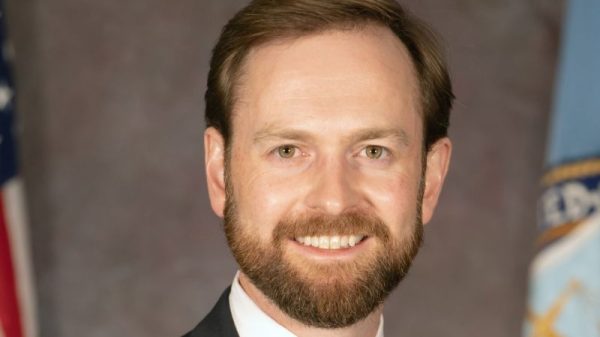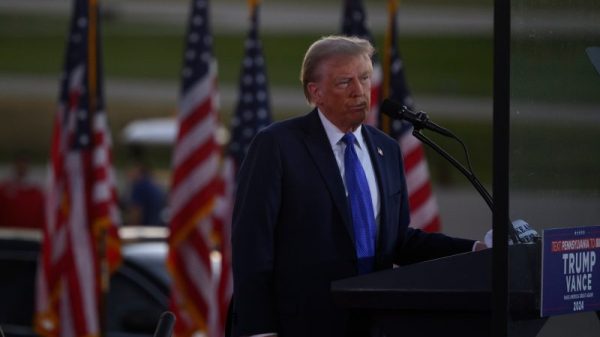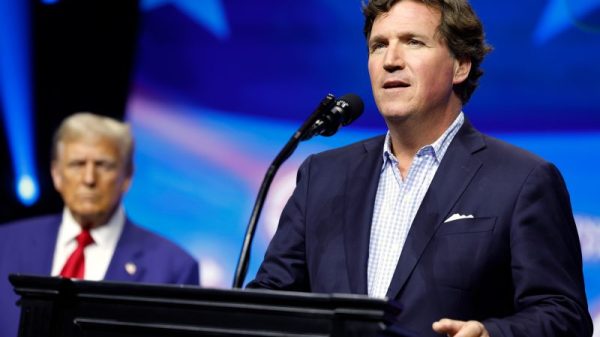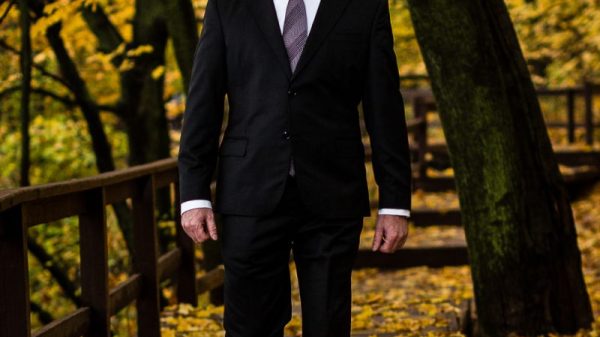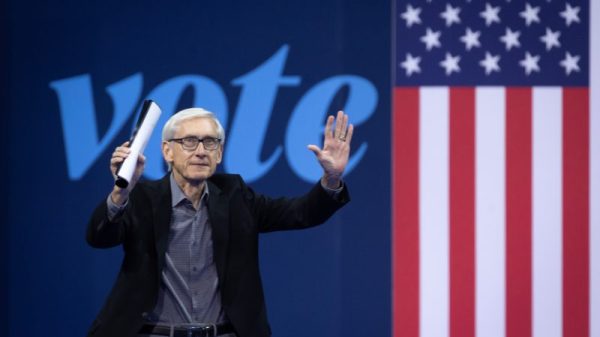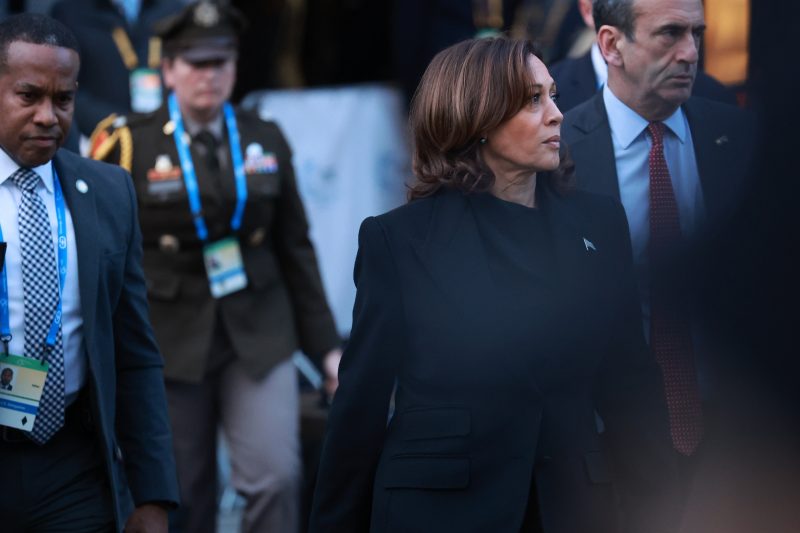In a White House where President Biden has grounded his reputation on 50 years of dealings in global affairs, Vice President Harris has had little chance to forge her own foreign policy, even as she has traveled the globe on his behalf.
But if she claims the Democratic presidential nomination and then the White House, Harris, a longtime prosecutor, would apply her decades spent battling in courtrooms to confronting the world’s most pressing crises and standing firm against U.S. adversaries should they seek to test her, say people who have worked with her. Observers said the leaders of Russia and China would be most likely to try.
Aides say the core of her foreign policy would not likely swerve from Biden’s robust support for Ukraine, which remains at war with Russia, and his hard line on China as it seeks to displace the United States as the world’s leading superpower. On Gaza — the most divisive global issue among Democrats — Harris has carved out a distinct rhetorical lane, voicing sharp criticism of Palestinian suffering even while continuing to back strong military support for Israel.
But she is likely to approach global problems differently from Biden, who has longtime personal relationships with leaders such as Israeli Prime Minister Benjamin Netanyahu and Russian President Vladimir Putin through decades of service on the Senate Foreign Relations Committee and two terms as vice president. That experience shaped his rigid views on many issues, officials say.
Her aides and allies note that Harris, like former president Barack Obama, is a lawyer with a social justice bent who challenges staff to prove their assumptions and defends law and order with a prosecutor’s zeal.
“She did not come into office with foreign policy experience, but she brought some other things which were really invaluable, to include a searing intellect, really sound judgment and gut instinct that was invariably on the mark,” said Nancy McEldowney, Harris’s national security adviser for her first year in office. “She has spent the last three and a half years not just learning on the job, but really leading.”
This account of Harris’s foreign policy approach is based on interviews with 14 U.S. and international policymakers, analysts and others who have worked closely with her, many of them speaking on the condition of anonymity to be candid about their private interactions. Harris’s office declined to make her available for an interview.
Republicans view Harris’s foreign policy record as a vulnerability, blasting what they say are failed policies to address migration and what they allege would be weaker support for Israel than their nominee, Donald Trump. Trump has said that had he been president, Russia would not have attacked Ukraine and Hamas would not not have hit Israel.
“Kamala Harris has zero foreign policy experience aside from supporting Joe Biden’s weak agenda that has emboldened our adversaries, led to war in Ukraine, and enabled Iranian-backed terrorists to attack Israel,” said a spokeswoman for the Trump campaign, Karoline Leavitt, calling her “dangerously liberal” and asserting there is “zero doubt that America will be a more dangerous place if she was our Commander in Chief.”
Harris takes part in the president’s daily brief, an intelligence analysis of pressing national security matters, when she and Biden both are in Washington. When Biden’s Cabinet gathers to discuss foreign policy issues, she’s the person who pressure-tests the advice handed up to the president, aides say. Her main foreign policy adviser, Philip Gordon, is a longtime aide to Democratic administrations and wrote a book in 2020 examining the history of failure when the United States has tried to engage in regime change in the Middle East.
“She thinks it is important to challenge assumed truths and established patterns in trying to find new and better solutions,” McEldowney said.
All vice presidents face the challenge of defining a role that has no set responsibilities, and Harris has been no exception. In her 17 foreign trips, she has spoken on behalf of Biden but also sought to put her own stamp on policy, building ties in the Indo-Pacific and Africa, officials said. The daughter of two immigrants — her mother was from India and her father from Jamaica — she has advocated for the United States to maintain a robust role in the world.
While speaking in 2022 to U.S. sailors based in Japan, Harris highlighted the military’s role enforcing the right to navigate international waters to which China has laid claim, saying their presence in the Pacific is intended to defend “rules and norms that have provided for unprecedented peace and prosperity for the American people and, indeed, for the people of this region.”
Harris, if elected, would enter office with a smaller cadre of foreign policy aides than Biden, who had a team that had worked with him for years in the Senate and during his vice presidency. As vice president, Harris has had unusually high staff turnover.
And her efforts to promote U.S. policy have not always been successful.
At a security conference in Munich in February, where many European leaders were looking at U.S. opinion polls and growing concerned about Washington’s future commitment to Ukraine and NATO, Harris sought to quell fears.
Working with autocratic leaders and undermining alliances “is dangerous, destabilizing and indeed shortsighted,” she said, taking aim at Trump and his Republican allies who have contemplated leaving NATO. “That view would weaken America and would undermine global stability and undermine global prosperity.”
Many European policymakers who watched her speech questioned whether her assurances met the moment. Some were searching for practical advice about how to deal with political instability in Washington and said that they found her approach more condescending than helpful. Officials who met with her privately in Munich said she was more engaging behind closed doors.
When Biden in 2021 assigned Harris what became her best-known foreign policy initiative, the effort to deter irregular migration from Central America, he handed her a seemingly intractable challenge that he himself had worked on under Obama. It was a politically radioactive mission. While officials note that Harris was never tasked with managing immigration enforcement, which falls to the Department of Homeland Security, Republicans labeled her the administration’s “border czar” as they blamed Biden for surging entries into the United States.
Addressing root causes in the “Northern Triangle” nations of Honduras, Guatemala and El Salvador would be a daunting challenge given the United States’ fraught history with Central America.
“What she really brought to the table was saying, ‘Look, we have to include the private sector to have lasting impact,’” a White House official said. “We’re not going to solve it overnight, but as she has said many times, we have to give people economic opportunity at home.”
Rebecca Bill Chavez, who served as co-lead of Harris’s foreign policy team during her 2020 presidential run, said Harris understood the need to address the underlying drivers of migration, including long-standing issues of poverty, inequality, corruption and insecurity. Harris also emphasized “the very real problem of widespread gender-based violence and on the protection of human rights and labor rights,” said Chavez, who now serves as president and CEO of the Inter-American Dialogue.
While officials say the initiative was never intended to produce a short-term fix, they point to the fact that dozens of companies have pledged or provided investments worth more than $5 billion as part of the effort to create jobs and conditions to help people stay put.
Harris’s work on Central America also has spotlighted her communication struggles. When she chose Mexico and Guatemala as her first overseas destinations, she delivered tough remarks to would-be migrants: “Do not come,” she said, comments that troubled some progressive Democrats who cited migrants’ right to legally seek asylum in the United States. Aides note she was simply repeating Biden’s rhetoric, saying it played differently on foreign soil.
During that trip, Harris also gave a widely panned interview to NBC News in which she appeared exasperated when asked whether she had visited the southern border since becoming vice president. Analysts have said her blunt focus on corruption in Latin America has likewise been off-putting to business leaders from the region.
On Ukraine, Harris hasn’t driven policy, but aides say she has led at critical moments with key European allies. In February 2022, five days before Russia’s full-scale invasion, Harris was charged with walking Volodymyr Zelensky through Western intelligence indicating an attack was days away, pushing the Ukrainian president, who had been publicly dismissive of the threat, to prepare for war.
“It was a combination of really incontrovertible evidence and a senior leader speaking with passion and conviction, but also real empathy,” McEldowney recalled. “I think it was quite decisive in persuading him.”
One senior European policymaker who attended a Ukrainian-organized peace conference last month in Switzerland observed that Harris delivered “strong remarks” and appeared at ease with other leaders. But this person warned that “niceties” are less important than decision-making qualities, and said that “Russia and China will definitely test a new president they do not know.”
If elected, the most complicated foreign policy issue for Harris is likely to be the bloody conflict in Gaza, where the local health ministry says Israel has killed more than 39,000 Palestinians in the months since Hamas militants’ cross-border attack Oct. 7. Harris has focused on what happens after the fighting stops.
Biden has provided billions of dollars in military support to the Israeli government and has been reluctant to hold back aid even as his frustrations have grown with Netanyahu over the war’s civilian toll.
But over the winter, as Biden voiced cautious criticism of Israel, Harris declared the war “a humanitarian catastrophe.” Her remarks, during an address in Alabama, were widely seen at the time as more assertive than the president had been.
An aide to Harris said the comments were in keeping with the administration’s push for a cease-fire. But the official acknowledged her forceful tone and that she had chosen to evoke visceral images — children eating animal feed, women giving birth to malnourished babies — in seeking to amplify pressure on Israel to let more aid into Gaza.
Harris also was an early proponent of preparing for the conflict’s aftermath, tasking Gordon and her deputy national security adviser, Ilan Goldenberg, with devising proposals in partnership with Biden’s White House advisers and the State Department that seek a lasting peace for the region. She was the first U.S. official to push Arab heads of state to confront the issue, telling many at a December meeting in Dubai that postwar planning must be atop the agenda, aides said.
Her focus on Palestinian suffering has given hope to some critics of the administration’s Israel policy. But some analysts caution against expecting a major policy shift if she prevails in November.
“There is an interest in trying to find daylight between her and President Biden on foreign policy issues,” said Halie Soifer, Harris’s national security adviser when she served on the Senate Intelligence Committee and who is now the head of the Jewish Democratic Council of America. “There’s no daylight to be found.”

